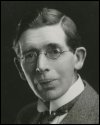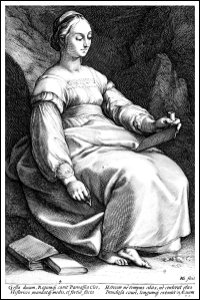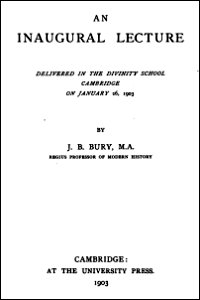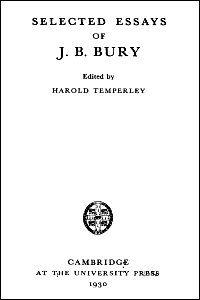J.B.Bury’s works – 1903
![]()
AN INAUGURAL LECTURE: THE SCIENCE OF HISTORY
![]()
![]()
published as:
- AN INAUGURAL LECTURE: THE SCIENCE OF HISTORY, Cambridge, University Press, 1903
republished in:
- Harold TEMPERLEY – SELECTED ESSAYS OF J. B. BURY, Cambridge, University Press, 1930 (pp.3-22)
![]()
| 2 copies available: | |
|
 |
|
 |
![]()
—
… In the story of the nineteenth century, which has witnessed such far-reaching changes in the geography of thought and in the apparatus of research, no small nor isolated place belongs to the transformation and expansion of history. That transformation, however, is not yet complete. Its principle is not yet universally or unreservedly acknowledged. It is rejected in many places, or ignored, or unrealised. …. It has not yet become superfluous to insist that history is a science, no less and no more; and some who admit it theoretically hesitate to enforce the consequences which it involves. … [p-6]
—
… A right notion of the bearing of history on affairs, both for the statesman and for the citizen, could not be formed or formulated until men had grasped the idea of human developement. This is the great transforming conception, which enables history to define her scope. … [p.17]
—
… The principle of continuity and the higher principle of developement lead to the practical consequence that it is of vital importance for citizens to have a true knowledge of the past and to see it in a dry light, in order that their influence on the present and future may be exerted in right directions. For, as a matter of fact, the attitude of men to the past has at all times been a factor in forming their political opinions and determining the course of events. … But the clear realisation of the fact that our conception of the past is itself a distinct factor in guiding and moulding our evolution, and must become a factor of greater and increasing potency, marks a new stage in the growth of the human mind. … [p-22]
—
… it bids us consider the whole sequence up to the present moment as probably no more than the beginning of a social and psychical developement, whereof the end is withdrawn from our view by countless millenniums to come. All the epochs of the past are only a few of the front carriages, and probably the least wonderful, in the van of an interminable procession. [p.28]
—
… One of the features of the renovation of the study of history has been the growth of a larger view of its dominion. Hitherto I have been dwelling upon its longitudinal aspect as a sequence in time, but a word may be said about its latitude. … The growth of the larger conception was favoured by the national movements which vindicated the idea of the people as distinct from the idea of the state; but its final victory is assured by the application of the principle of developement and the “historical method” to all the manifestations of human activity — social institutions, law, trade, the industrial and the fine arts, religion, philosophy, folklore, literature. Thus history has acquired a much ampler and more comprehensive meaning, along with a deeper insight into the constant interaction and reciprocity among all the various manifestations of human brain-power and human emotion. … [p.35]
—
… if, year by year, history is to become a more and more powerful force for stripping the bandages of error from the eyes of men, for shaping public opinion and advancing the cause of intellectual and political liberty, she will best prepare her disciples for the performance of that task, not by considering the immediate utility of next week or next year or next century, not by accommodating her ideal or limiting her range, but by remembering always that, though she may supply material for literary art or philosophical speculation, she is herself simply a science, no less and no more.
[John Bagnell Bury – 1903]
![]()
—
… In the story of the nineteenth century, which has witnessed such far-reaching changes in the geography of thought and in the apparatus of research, no small nor isolated place belongs to the transformation and expansion of history. That transformation, however, is not yet complete. Its principle is not yet universally or unreservedly acknowledged. It is rejected in many places, or ignored, or unrealised. …. It has not yet become superfluous to insist that history is a science, no less and no more; and some who admit it theoretically hesitate to enforce the consequences which it involves. … [p-6]
—
… A right notion of the bearing of history on affairs, both for the statesman and for the citizen, could not be formed or formulated until men had grasped the idea of human developement. This is the great transforming conception, which enables history to define her scope. … [p.17]
—
… The principle of continuity and the higher principle of developement lead to the practical consequence that it is of vital importance for citizens to have a true knowledge of the past and to see it in a dry light, in order that their influence on the present and future may be exerted in right directions. For, as a matter of fact, the attitude of men to the past has at all times been a factor in forming their political opinions and determining the course of events. … But the clear realisation of the fact that our conception of the past is itself a distinct factor in guiding and moulding our evolution, and must become a factor of greater and increasing potency, marks a new stage in the growth of the human mind. … [p-22]
—
… it bids us consider the whole sequence up to the present moment as probably no more than the beginning of a social and psychical developement, whereof the end is withdrawn from our view by countless millenniums to come. All the epochs of the past are only a few of the front carriages, and probably the least wonderful, in the van of an interminable procession. [p.28]
—
… One of the features of the renovation of the study of history has been the growth of a larger view of its dominion. Hitherto I have been dwelling upon its longitudinal aspect as a sequence in time, but a word may be said about its latitude. … The growth of the larger conception was favoured by the national movements which vindicated the idea of the people as distinct from the idea of the state; but its final victory is assured by the application of the principle of developement and the “historical method” to all the manifestations of human activity — social institutions, law, trade, the industrial and the fine arts, religion, philosophy, folklore, literature. Thus history has acquired a much ampler and more comprehensive meaning, along with a deeper insight into the constant interaction and reciprocity among all the various manifestations of human brain-power and human emotion. … [p.35]
—
… if, year by year, history is to become a more and more powerful force for stripping the bandages of error from the eyes of men, for shaping public opinion and advancing the cause of intellectual and political liberty, she will best prepare her disciples for the performance of that task, not by considering the immediate utility of next week or next year or next century, not by accommodating her ideal or limiting her range, but by remembering always that, though she may supply material for literary art or philosophical speculation, she is herself simply a science, no less and no more.
[John Bagnell Bury – 1903]
—
—

—
[Progress] means that civilisation has moved, is moving, and will move in a desirable direction.
—
John B. Bury (1861-1927)





